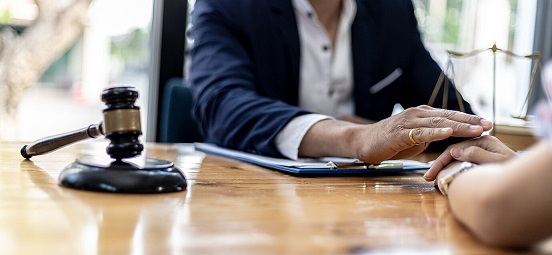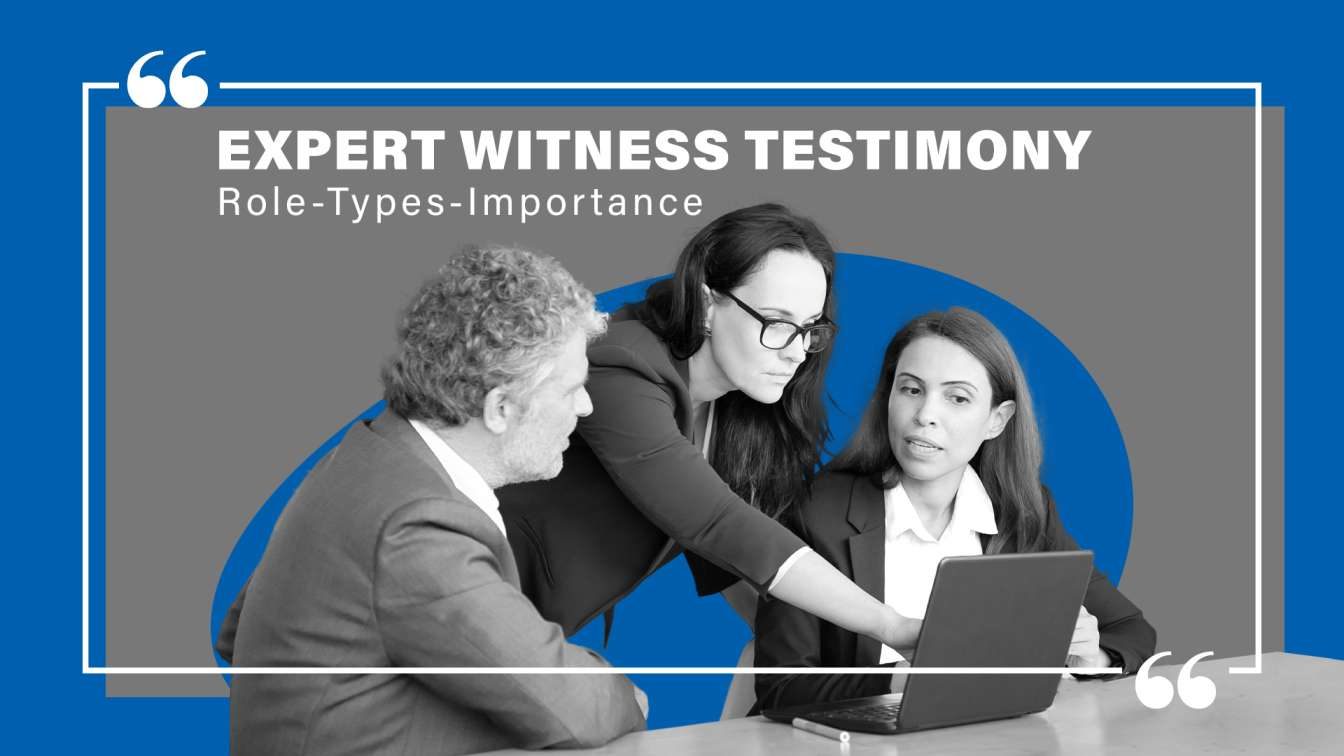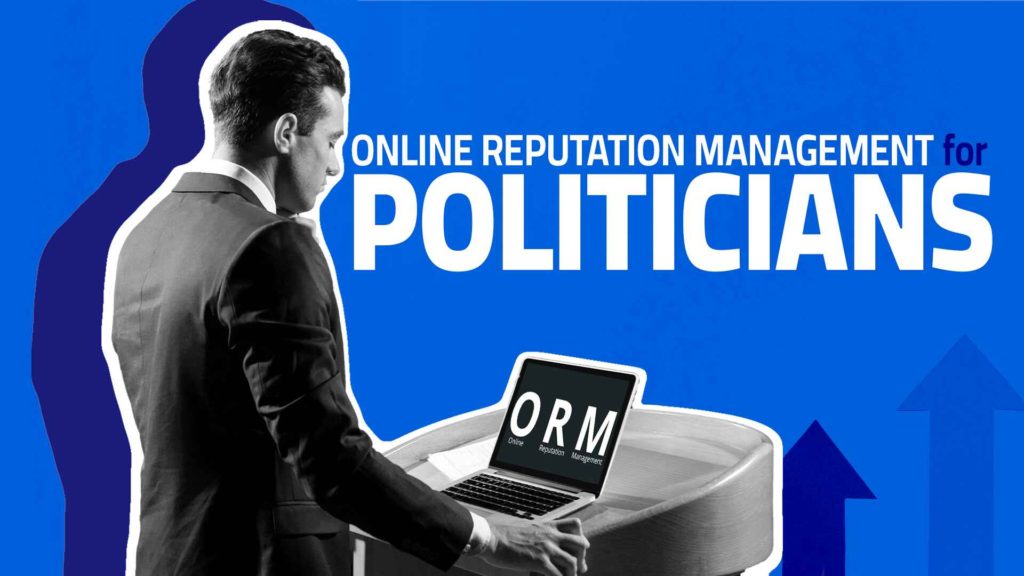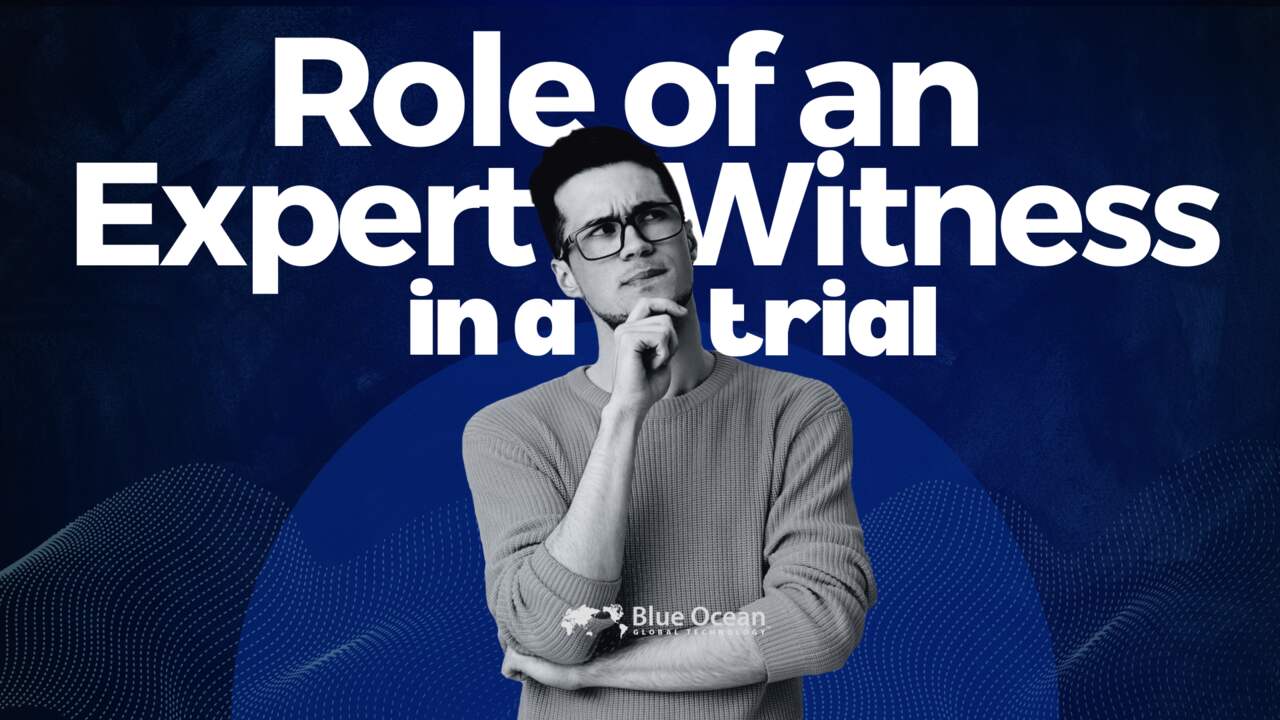Overview
- The importance of expert witness testimony, including legal standards and admissibility criteria.
- Qualifications, credibility factors, and ethical considerations in expert testimony.
- How expert testimony influences judicial decisions.
Introduction
Expert witness testimony fulfills a critical role in courts by providing courts the necessary specialized knowledge to analyze and draw conclusions about evidence or testimony concerning complex matters. An expert, for instance, analyzes evidence, offers opinions, and assists jurors in understanding technical subjects.
For a court to analyze evidence and offer professional opinions toward the aiding of judicial decisions, expert witness testimony allows such an appraisal to be made about complex matters.

What is an Expert Witness Testimony?
Definition
Expert witness testimony refers to those opinions offered by professionals in their respective fields to elucidate on complex matters pertaining to a legal case. Unlike lay witnesses, it is the professionals’ knowledge that is the basis of said expert witnesses’ testimony, as opposed to the personal experience basis for lay witnesses.
Purpose
Expert witness testimony plays a crucial role in legal proceedings by clarifying complex technical, scientific, or specialized subjects that may be beyond the understanding of judges and jurors. By providing professional insights, expert witnesses help strengthen legal arguments, interpret evidence, and support factual claims in both civil and criminal cases. Their testimony ensures that informed and accurate decisions are made based on specialized knowledge.
Legal Recognition
Recognition is governed by standards such as Rule 702 (Federal Rules of Evidence) and the Daubert or Frye tests. Qualification is assessed based on:
- Education and credentials
- Peer-reviewed publications
- Courtroom testimony experience
- Professional reputation
What Are the Legal Standards for Admissibility of Expert Witness Testimony?
Legal Standards
- Daubert Standard: Judges act as gatekeepers, requiring testable, peer-reviewed, and accepted methods.
- Frye Standard: It relies on whether the expert’s methodology is generally accepted in the relevant scientific community, rather than being subjected to independent judicial analysis of its reliability. Still used in some states including New York, Illinois, Pennsylvania, and California (in limited contexts).
- Federal Rules of Evidence (Rule 702): Defines admissibility criteria based on an expert’s qualifications and the reliability of their methodology.
FS: The Daubert Standard ensures expert testimony is based on reliable, scientific methods, while the Frye Standard requires general acceptance in the field.
Frye Standard vs. Daubert Standard
- Daubert emphasizes scientific validity and judicial gatekeeping.
- Frye relies on general acceptance within the field.
- The U.S. federal system follows Daubert, while some states still use Frye.
Key Legal Precedents
- Daubert v. Merrell Dow Pharmaceuticals (1993)—Established the Daubert Standard.
- General Electric Co. v. Joiner (1997)—Gave judges authority to exclude unreliable expert testimony.
- Kumho Tire Co. v. Carmichael (1999) – Expanded Daubert to all expert testimony.
- Frye v. United States (1923)—Introduced the Frye Standard.
Find Qualified Economic Expert Witnesses for Your Case
Contact us today to find the expert you need for your case!
What Is the Role of an Expert Witness in Legal Cases?
Primary Duties
Expert witnesses play a crucial role in legal proceedings by providing specialized knowledge and testimony to assist the court in understanding complex matters. Their primary responsibilities include:
- Analyzing evidence: Experts examine case materials, conduct research, and apply their specialized knowledge to assess the facts presented.
- Providing objective opinions: They must offer impartial, fact-based interpretations of technical or scientific information relevant to the case.
- Preparing expert reports: Experts compile their findings into detailed reports that outline their methodologies, conclusions, and the rationale behind their opinions.
- Testifying in court: As key witnesses, they present their expert opinions in court, often explaining technical concepts in a way that judges and jurors can understand.
Additional Insights
- Expert Witness vs. Lay Witness: The major difference between an expert witness and a lay witness is that a lay witnesses recount observations, whereas an expert witnesses provide specialized interpretations.
- Influence on Case Outcomes: Expert testimony can be pivotal in shaping verdicts.
- Ethical Considerations: Experts must remain unbiased and transparent about their opinions.
Increasing Scrutiny (2025 Trend)
Modern jurors are more skeptical, especially post-COVID and post-AI boom. According to a recent Reuters article, public trust in expert testimony is declining. Experts must now:
Be demonstrably impartial
Use visual aids and structured demonstrations
Avoid jargon and exaggerated claims

Source: Freepik
What Are the Different Types of Expert Witnesses?
Expert witnesses come from various fields and specialize in different areas of expertise. Their testimony helps clarify complex technical, scientific, or professional matters in legal cases. Below are some common types of expert witnesses:
By Discipline
- Medical Experts: Often used in malpractice and personal injury cases to explain diagnoses, causation, or standards of care.
- Engineering Experts: Common in structural failure and product liability cases.
- Financial Experts: Vital in fraud, divorce, and economic damage assessments.
- Forensic Experts: Analyze DNA, trace evidence, or crime scene data.
- Legal Ethics Experts: Offer insight into appropriate standards of conduct.
Emerging Needs
- AI & Tech Ethics Experts: Growing demand in IP and regulatory cases.
- Cybercrime Specialists: Especially in data breach litigation.
- Climate & Environmental Analysts: Increasing relevance in environmental disputes.
What Are the Formats of Expert Testimony?
Methods of Presentation
Expert testimony can be presented in different ways depending on the case.
Listing:
- Oral Testimony: Delivered live in court, allowing cross-examination.
- Written Reports: Submitted as official documentation for legal review.
- Testifying Experts: Present findings in court.
- Consulting Experts: Advise legal teams without testifying.
Both oral and written expert witness testimony play crucial roles in court proceedings, each serving distinct functions.

Source: Pexel
What Are the Two Types of Evidence in Legal Proceedings?
- Direct Evidence: Directly proves a fact (e.g., eyewitness testimony, video footage).
- Circumstantial Evidence: Requires inference (e.g., forensic analysis, financial records).
Experts often help convert circumstantial evidence into logically sound narratives, especially in forensic and medical cases.

Picture Credits: Freepik
Who Qualifies as an Expert Witness?
Criteria for Recognition
- Advanced academic or professional credentials
- Peer-reviewed or industry-recognized contributions
- Absence of conflicts or bias
- Prior expert testimony or consulting experience
Disqualification Factors
- Demonstrated partiality or financial conflict
- Lack of domain-specific relevance
- Failure to follow accepted methodology
Checklist: Finding an Expert Witness
- Confirm relevance
- Validate qualifications
- Screen for conflicts
- Review past testimonies for consistency
Expert Witness Services and Compensation
Hiring Process
- Experts can be hired directly by attorneys or through agencies specializing in expert witness services.
Fee Structures
Table Definition: Expert witness compensation varies by payment structure.
| Fee Type | Description |
| Hourly Rates | Charged for consultation, research, and testimony |
| Flat Fees | Fixed changes for services |
| Contingency Fees | Less common due to ethical concerns |
Ethical Considerations
- Experts must avoid conflicts of interest and ensure fair compensation practices.
Practical Preparation Tips for an Expert Witness Testimony
- Begin drafting expert reports early and conduct internal peer reviews.
- Use analogies and metaphors to simplify complex technical concepts.
- Create visual timelines or animations when appropriate to enhance clarity.
- Schedule mock cross-examinations to build courtroom readiness.
- Ensure all presentations align with admissibility standards and courtroom protocols.
Conclusion
Expert witness testimony plays a crucial role in legal cases by providing specialized insights that help courts interpret complex evidence. Expert witness credibility depends on qualifications, experience, and adherence to legal standards. Expert testimony can significantly influence case outcomes by clarifying facts and supporting legal arguments. Maintaining objectivity and ethical integrity ensures their testimony remains fair and reliable in judicial decisions.
Frequently Asked Questions
1. What is the difference between a fact witness and an expert witness?
Fact witnesses provide firsthand accounts, while expert witnesses offer professional opinions based on expertise.
2. What qualifications are required to be an expert witness?
Courts assess experience, education, and professional credibility.
3. Can an expert witness be disqualified?
Yes, if found biased, lacking expertise, or having conflicts of interest.
4. What is the most commonly used standard for expert witness testimony in U.S. courts?
The Daubert Standard is widely used in federal and many state courts.
5. Do expert witnesses always testify in court?
No, some serve as consulting experts without testifying.
Contact us today to find the expert you need for your case!
Get in touch with us for a free consultation today!















